Explore the latest news and find out what's on this month
Explore our learning offer for schools, families and community groups
Uncover the rich history of Elmbridge with our latest online exhibitions
Want to discover more about your local area?
Explore the latest news and find out what's on this month
Explore our learning offer for schools, families and community groups
Uncover the rich history of Elmbridge with our latest online exhibitions
Want to discover more about your local area?
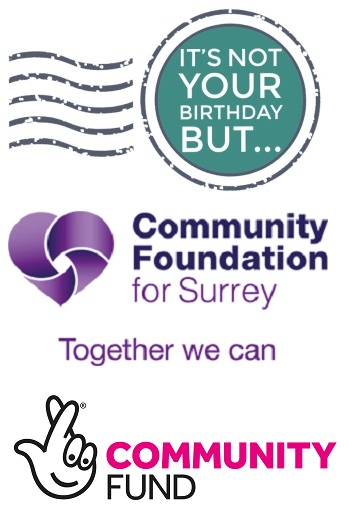
In response to the first wave of the pandemic in 2020, It’s Not Your Birthday But worked with Claygate Centre for the Community and an army of brilliant creative volunteers, to mobilise Words on Wheels. A selection of cards, letters, crafts, art and a whole range of creative connections were delivered with Meals on Wheels to people who lived alone in our community.
They received great feedback from the recipients; the deliveries made them feel less alone and gave them creative nourishment and inspiration. Once a relationship had been established, they began to see how many of the recipients had little or no contact with others. It was from here that the idea of ‘Nothing About Us Without Us’ was born: giving those people the chance to be recorded speaking about who they were, what mattered to them, and how the lockdown had been for them – and to get a professional portrait done in the process.
The National Lottery Community Fund and the Community Foundation for Surrey funded It’s Not Your Birthday But to work with 20 people in our community. Here, you can explore the 20 portraits by artist Erika Flowers, snippets from the oral histories, and learn more about how the project was conducted.
We are grateful for the support of Claygate Centre for the Community, Kingston Liberal Synagogue, Milaap Centre, PA Housing, the RC Sherriff Trust, and our team of dedicated volunteers.
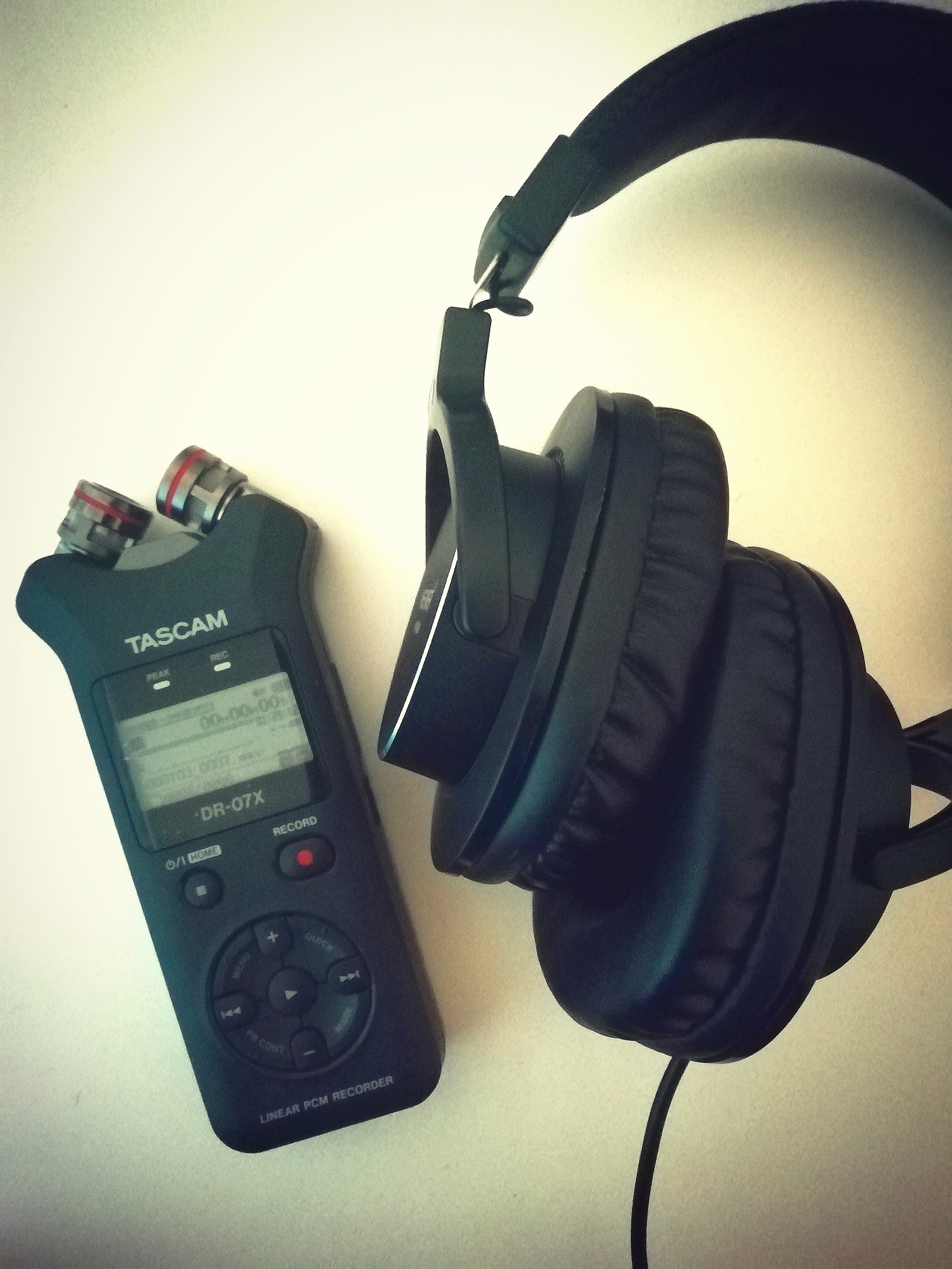 Oral history recording equipment.
Oral history recording equipment.
With the help of partner organisations, we reached out to 20 local people who would most benefit from the project and began work with them in 2020. After undertaking oral history training in preparation for the interviews, the plan had originally been to record our volunteers’ chats with each sitter whilst they were having their portrait drawn live. New lockdowns, however, forced a change of tactics. Instead, each participant had a doorstep photo shoot and interviews were subsequently conducted online or by phone.
The project’s impact on participants has been profound. As well as feeling less isolated during the challenging times presented by the pandemic, many have commented on how encouraged they feel that their community is interested in hearing from them. Through Elmbridge Museum’s archive and website, the portraits and words of those involved will have a permanent legacy for our local area’s future generations.
Find out more about the portrait artist Erika Flowers and her other projects
“Well, I was [busy] till covid struck, I mean we’d go out, friends drinking coffee and art club which we went to, with the R.C. Sheriff thing which was great, and then all sorts of things – they used to have a film show in the afternoon sometimes, once a month, so that was good. But now there’s just nothing.
Last year I spent the year planting plants, and then of course in the middle of all that, at the beginning of the covid I got cancer – breast cancer – which was lucky I discovered it, because it was tiny, so that was very lucky that that was discovered. So everybody should have a mammogram.”
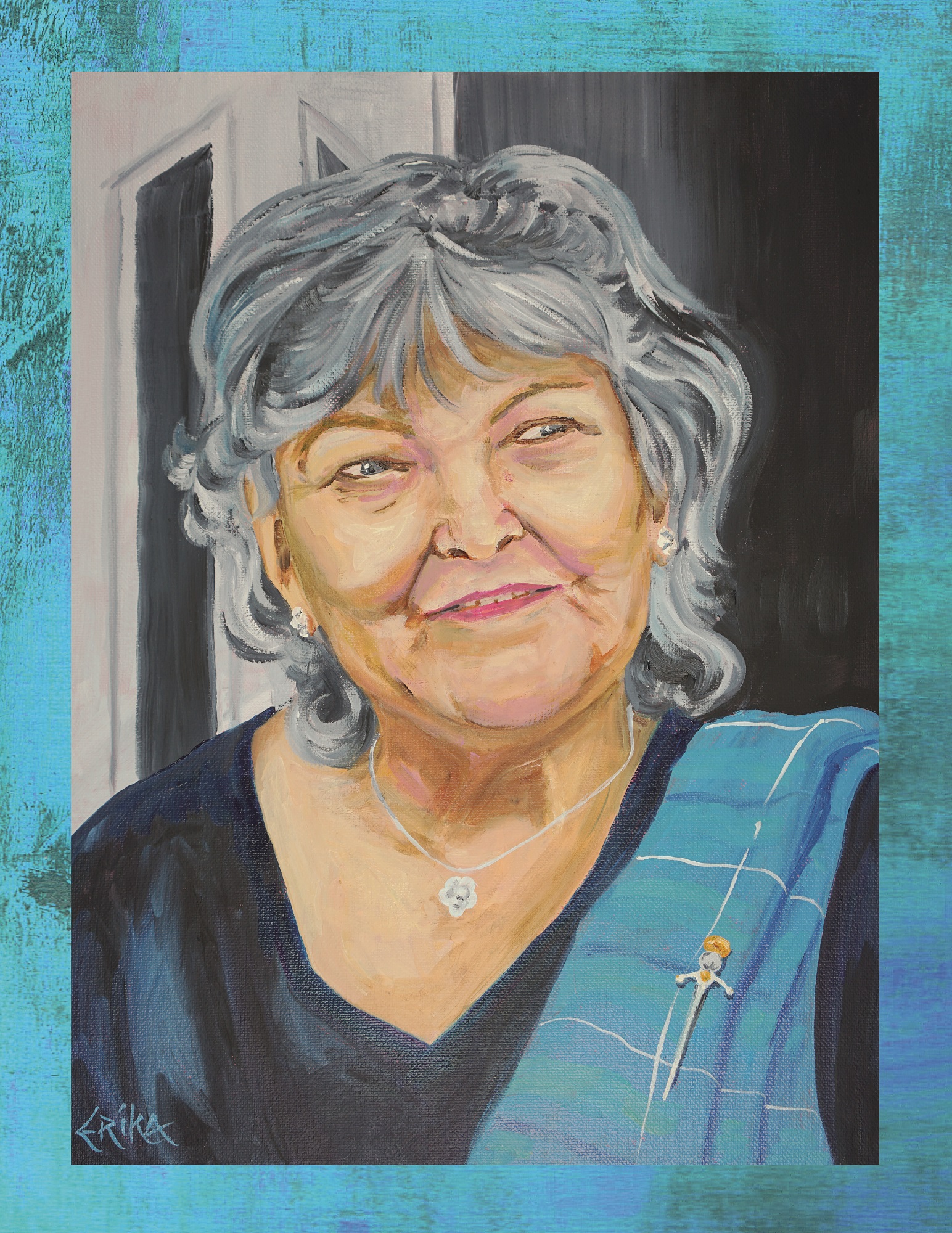
“I distinctly remember going in the pram, sitting in the pram being pushed down from Hersham to Rodney House, and I wanted the hood down, and it was freezing because it was December – because I’m nosy, I like to people watch – I even liked to people watch then you see!…
I remember my dad wouldn’t let me have the hood down, so I couldn’t see properly, and then I went into the hospital and we went to see Lorna who was the baby, but I was more interested – I’m sorry Lorna! – but I was more interested in the doll that my mum had made me. She made a doll, and then I got back in the pram and waved to her out the window, she was waving out the window.”
“I had to start with radiotherapy, but that was the beginning of covid, so I had to go down to Guildford for that, and it was lovely because there was no traffic on the road…
I was a bit worried about the radiotherapists leaning over me in case they’d caught it from the hospital! But they were all wearing masks then – they weren’t at first, the first couple of times, but then they started to gown up and mask up because it got – it was sort of serious then.”
“I enjoy looking up my ancestors. On Ancestry.com I’ve actually discovered that my great granddad, the naughty boy, would seem to be in Derry courts all the time for something or other!… the Irish ones it’s difficult to do, because they had a big burn, didn’t they, somewhere, where they burnt, all the blimming things got burnt. So it’s quite difficult, so you have to go through church records – and I do
On Ancestry you can go and look at other people’s, that have got somebody related to you, and if they’ve like a birth certificate or something on there you can take a photograph of it and stuff. I put in my great-grandad’s name, and I thought what’s that? Blimming courts, he was fighting! Got court for fighting, throwing a stone at somebody, fined about 10 bob, and then another occasion he was caught… going to pinch salmon.”
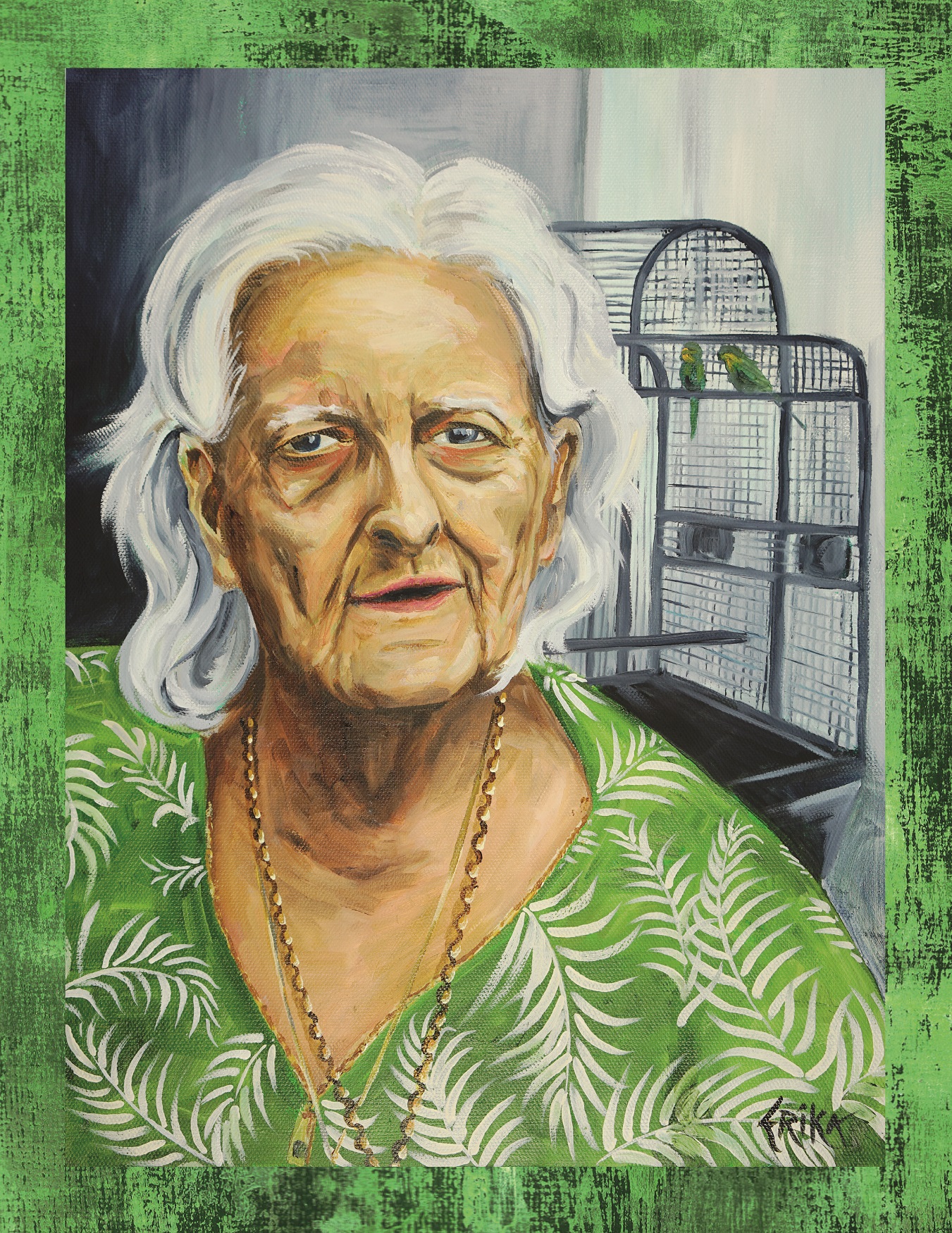 Portrait of Dill, by Erika Flowers
Portrait of Dill, by Erika Flowers
“You can walk about here, and I can go out in the garden – I’ve got a lovely garden, have you seen it?”
It’s gorgeous. Do you like gardening?
“I love gardening. My sister got me those plants. She’s lovely, my sister. She’s four years younger than me…
I used to walk my dog at Richmond Park… I got her from Battersea dog’s home… she was a Jack Russell found in London, homeless – Susie. She was a proper Jack Russell! Couldn’t stand the postman. I’ve had an Irish Red Setter as well, before her… I love dogs.”
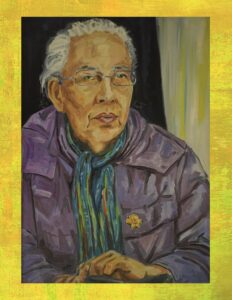
Portrait of Ann, by Erika Flowers
“I’ve got a cookbook. I’m expanding that and I am actually halfway through book 2, and I’ve been doing various pamphlets as well.
Christmas is coming, but we’ve also got a holiday called Hanukkah, which is a bit like, I compare it to Christmas and Diwali as a winter ‘light’ festival, so I’ve just finished my pamphlet with the help of a friend who sorted it out.
So I’ve been doing that, and as I say, creating recipes and changing them and thinking about what to put in book 2, and getting book 1. Actually, the community where my son is have just started cooking demonstrations based on my recipes. So, they’ve been having zoom sessions and they’ve let me join.”
“She [Vimala] had keys to our houses, so when we were at work she would have come in and left food in the fridge. That was a nice surprise!
She would pick my two up – there’s only 15 months between my children – she would pick them up from school, she would bring them back, she would feed them, then she would look for jobs to do, you know, she’d look in the dryer, look in the washing machine, everything would be folded, and then there’d be a meal for myself and my husband when I came at about, sort of, half 7, and then she would go. We’re not like her!…
That was how she showed us her love, in food actually, and in doing things for us.”
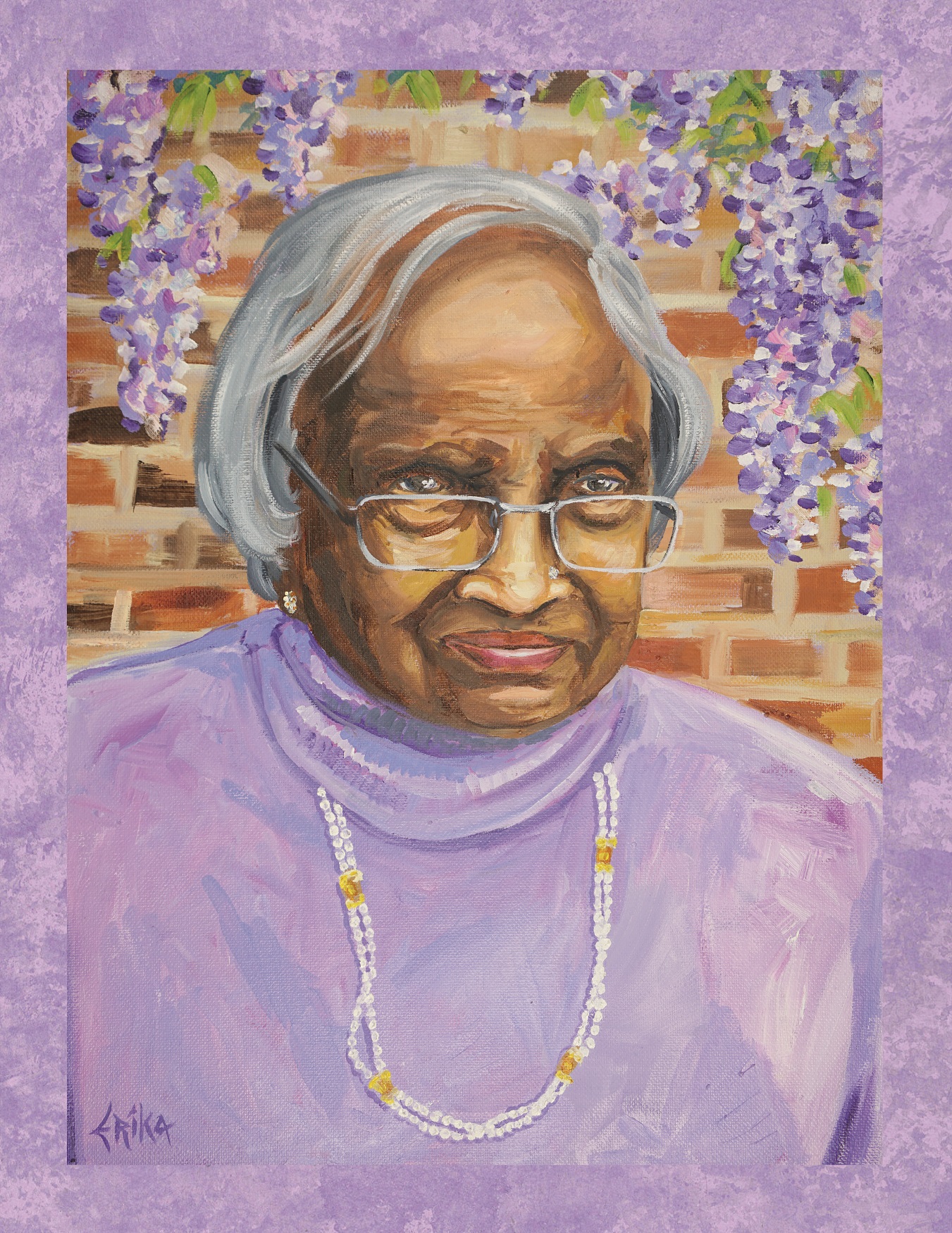
“She [Vimala] was born in 1939, in northern Sri Lanka, in a place called Jaffna. She was one of nine children, and she was the second youngest. She was close in age to the youngest, so the two of them, I just remember her saying how her and her little sister were always dressed the same, pigtails, always together, clothes were always handed down or homemade. But she had a happy childhood, from what we know…
I think they had close-knit friends, because when they [Vimala and her husband] came here, they had rooms in houses, you know, and all collectively together. And I think, actually, when they talk about those times, even though they didn’t have a great deal, they have a lot of fond memories because it was a question of coming together and cooking together, and looking after each other’s children, because they were all similar ages.”
“We had a strong association with Temple – we’re Hindus, and there was a Temple that was sort of set up temporarily on Fridays, they’d literally bring the statue in, and we would all congregate on Fridays, which was a big thing for the community. And sort of life revolved, didn’t it, really, around Temple.
I think my mum [Vimala] always tells a story of how, when she went for a parents evening, in sort of reception or one of the years of primary school, that I wrote the same things when we had to write what we did at the weekend, it was always ‘we went to Temple’, ‘we ate chicken curry’, and ‘we saw my aunts and uncles’, you know. So it was always, clearly did the same thing every week!”
“It’s funny because, for me, cooking, like, one main curry, is quite a lot of effort. But we grew up having at least four or five curries – so my mum would do a day’s work, come back, cook from scratch. And, you know, it wasn’t just one, it would be multiple curries. She was a very good cook. I mean most Asian mums are good cooks, aren’t they, but she was a very capable woman, she could do everything in a very short space of time.
And she was here at a time when sourcing ingredients to make our food was very difficult, and they had to be quite imaginative in making the dishes… She cooked for my wedding and we had 800 guests. She didn’t do it herself, but she had an army of helpers and I think Thames Ditton smelt of curry for about a month!”
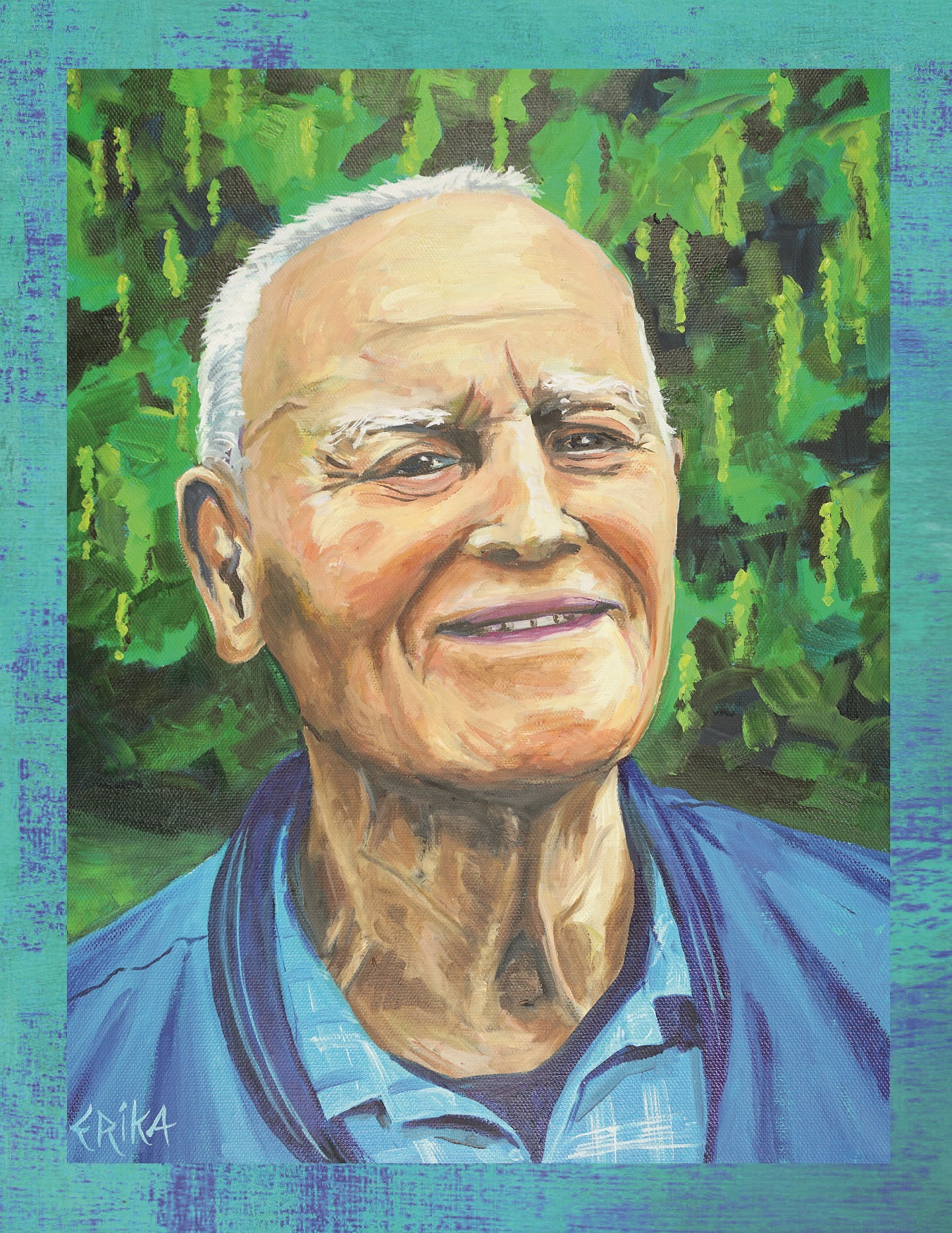 Portrait of John, by Erika Flowers
Portrait of John, by Erika Flowers
“We lived in Battersea until I was about four years of age, and then my dad was an engineer, so he wanted to work in engineering, so we moved to Molesey so he could work where Brooklands is now – it was Vickers-Armstrong. And he started working there as an engineer, and then in 1940, September, he was killed. Because it was bombed, and he was in charge of getting people to the shelters. And on the way to the shelters, he was machine gunned. So I was six years of age, and.. so that left just me and my mum…
During the war, I was evacuated to the Midlands, to Stoke-on-Trent, but I cried my eyes out, so she had to come and pick me up, bring me back. But it was very hard during the war, because my mum was doing war work, and she was never at home really. I was on my own a lot, so this pandemic reminds me so much of during the war, where we didn’t have much and it was hard going. But we got through it.”
My dad, Albert, chose war work instead of going into the army.
He was an engineer, and he was killed at Vickers-Armstrong on 4th September 1940, working on the Wellington Bomber. He was also a warden, getting people to the bomb shelter. As he was last out of the building, he was hit by shells from the German aircraft, and was killed.
We now know that 85 people were killed that day at Brooklands. My name is John, and I’m his son.
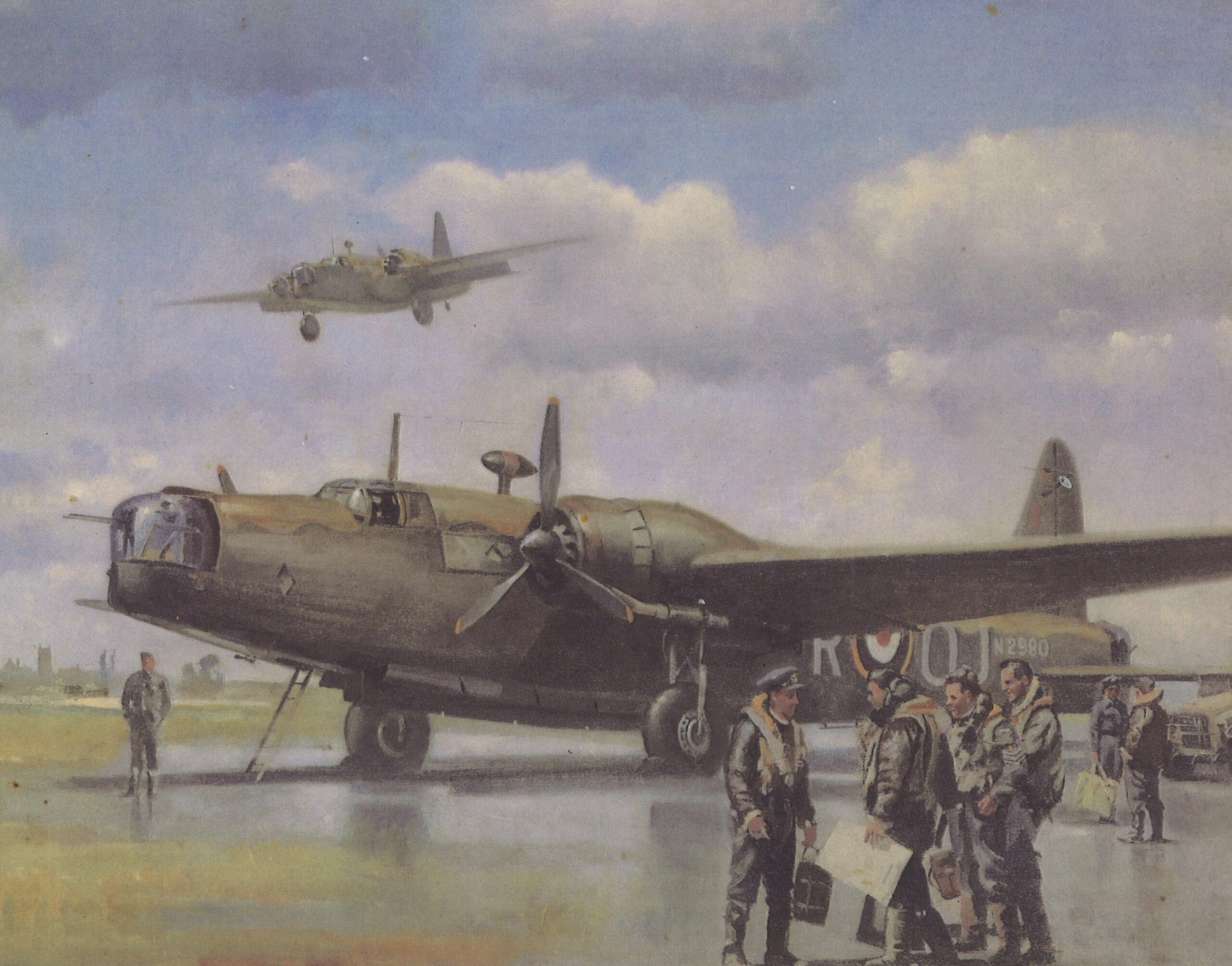 A picture belonging to John, showing the Wellington planes his dad worked on.
A picture belonging to John, showing the Wellington planes his dad worked on.
“Over the years, we’ve been trying to see if we could find out more about what happened on that day, in September 1940, and luckily my daughter, Karen, she has been ringing a certain lady that had something to do with it, about if we could get a plaque with the names of all the 85 people who were killed at Vickers-Armstrong on that day.
It’s taken 80 years, and a couple of months ago we had the joy of going to Brooklands Museum, and seeing a massive plaque with all the 85 names including my dad, and we had a lovely day there with the Mayor of Elmbridge, certain other people there, pilots…
We had a really nice day, but it’s taken 80 years to get that done.”
“When I left the army I worked at Vicker-Armstrong, where my dad was killed, I worked there for about three years, and then I thought well I haven’t been anywhere in the army, because they wouldn’t send me abroad because my mum was a war widow, so I emigrated to Canada…
In those days, you didn’t fly, I had to catch the train to Liverpool, and caught the boat from Liverpool, seven days on the ocean, to Quebec in Canada. And then because I didn’t speak French I thought well I can’t really stay here, I caught the train down to Toronto, and got a job – funny enough, the only job I could get was in an aircraft factory, the same as I’d been doing at Vickers-Armstrong in England.”
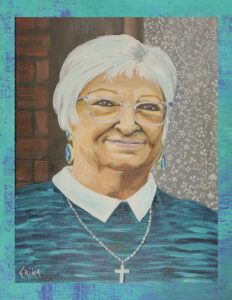
Portrait of Edith, by Erika Flowers
“I come from a big family and we were always together on the weekends. In summer we would go on picnics, there were 30 or 40 of us and we went to different picnic spots. All my brothers and sisters went to George in the Cape and slept in a self-contained flat. We all had our own flats but in the same building and then every day we would get together in the cars and go to different beaches and do lots of sightseeing. We had lovely holidays while we were growing up. It was just carefree…
We came here [to the UK] with just our clothes and that was it, and not very much money either. But, thank goodness, we were part of a big church in South Africa, and the pastor here had worked with the pastor in South Africa. So when we came over, we contacted him and we stayed with a lovely English couple who were at the church as well, and they helped us out tremendously, and then after 3 or 4 months we got a little flat and a job and settled here.”
“Before I got married, I also used to climb in the Alps, with a guide. So I was, until about the age of 80, I couldn’t resist going up any hill or mountain I saw! Whether in England or Scotland or wherever…
I used to go to the Lake District two or three times a year, walking. And walking was what I always did on holiday, and long-distance walking. I’ve walked the Pennine Way twice – that’s 278 miles. And I’ve walked various other long-distance paths, carrying all my own stuff…
I didn’t walk on my own. What happened was, some years ago I joined a fellowship group that was doing the Pennine Way, and we had seven other people on the party, and when we finished the walk, we decided we wanted to keep in touch, so we used to go to the Lake District for a week every year, for many years afterwards, until we all got too old.”
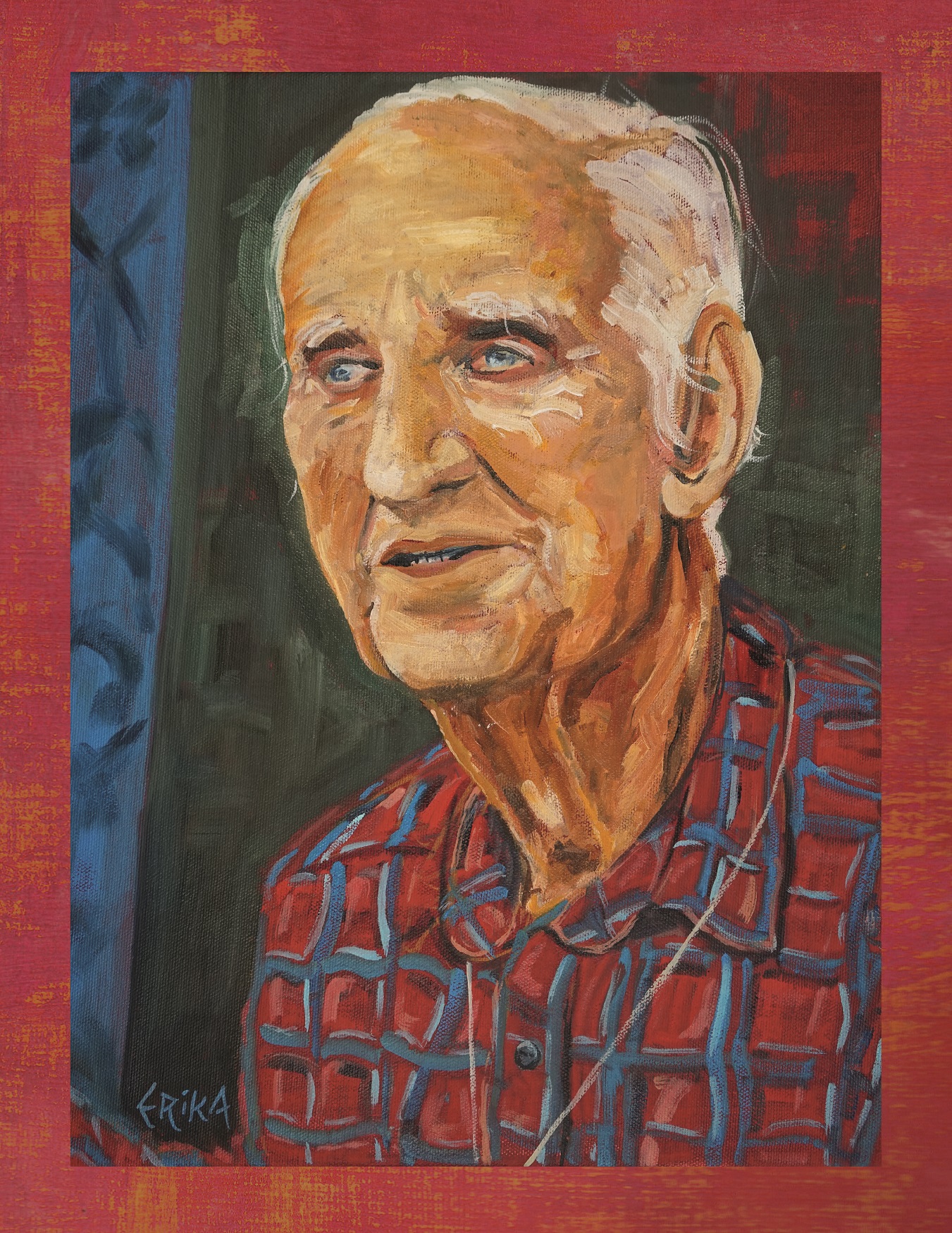
“I’ve always been a fanatical book collector, I couldn’t resist going into a second-hand book shop! And if I saw anything – I like biographies, and anything that looks interesting.
I’m finding books that I didn’t know I had and I hadn’t read. You know, if I saw something that interested me and it was in second-hand, I would buy it and stack it away for future reading! That’s kept me down in the lockdown actually, I’ve read quite a lot of them.”
“I’m still interested in birds and bird life, one of the programmes I like watching is Autumn Watch, you know, and Spring Watch. So I still take an interest in bird life, I did belong to the British Trust for Ornithology for a few years, and I used to make a return of all the birds I saw in my garden…
There’s been an enormous disappearance of birds, I’ve noticed incredibly – a lot of birds have disappeared, I don’t see them any more. It’s really quite distressing, lots and lots of common birds have disappeared.”
“I certainly didn’t think it [the Coronavirus pandemic] would go on for so long. I don’t think anybody really knew what was in store. I don’t think I worried too much at the outset. You sort of found out as time went along, how it was going to affect your way of life…
As time progressed it became obvious that it was a very serious thing, and my mind goes back to the Influenza outbreak after the Great War, because one of my mother’s sisters caught it, so I mean I did know something about how it affected people after the Great 14-18 war, what a serious business it was…
I don’t think anybody knew at the outset quite that it would put a stop, for the time being, to all the things one was involved with. As you know, I belong to one or two organisations, like the choral society and the Church, and certainly didn’t anticipate that they’d close down. Well, of course, the Church is keeping going online, but I haven’t sung a note in a choir since March [2020].”
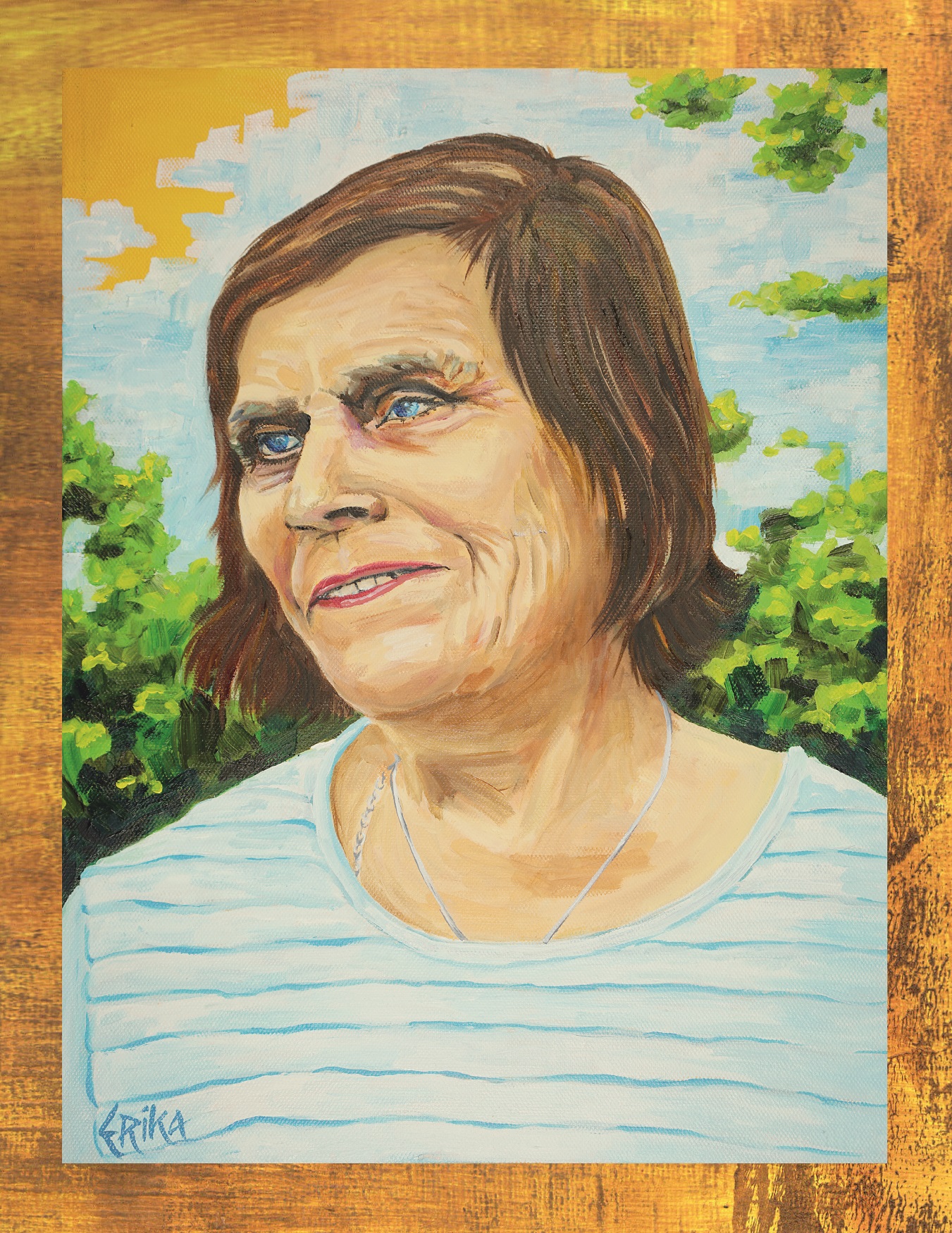 Portrait of Irene, by Erika Flowers
Portrait of Irene, by Erika Flowers
“I joined a club and I went karaoke – I used to sing… it depended where it [the club] went. My friend would tell me where it is, and they would come and pick me up… I like pop… Engelbert Humperdinck, Cliff Richard… I’ve got a load of DVDs and CDs…
I like going out and about, yes. I meet all my friends… They live all around, you know, I’ve got them all over the place… We go out for a drink or a meal, or we meet in the evening and go to one of the clubs. They’ve got music in there… Have a dance. I can’t do dancing like I used to… I used to remember all the 60s, I was always on the floor dancing…
How did you find lockdown?
Oh, very depressing. It took too long really. It was nearly a year before we came out of it… I had no one to talk to, you know, and I felt very lonely… I could ring my sisters, talk to them, you know.”
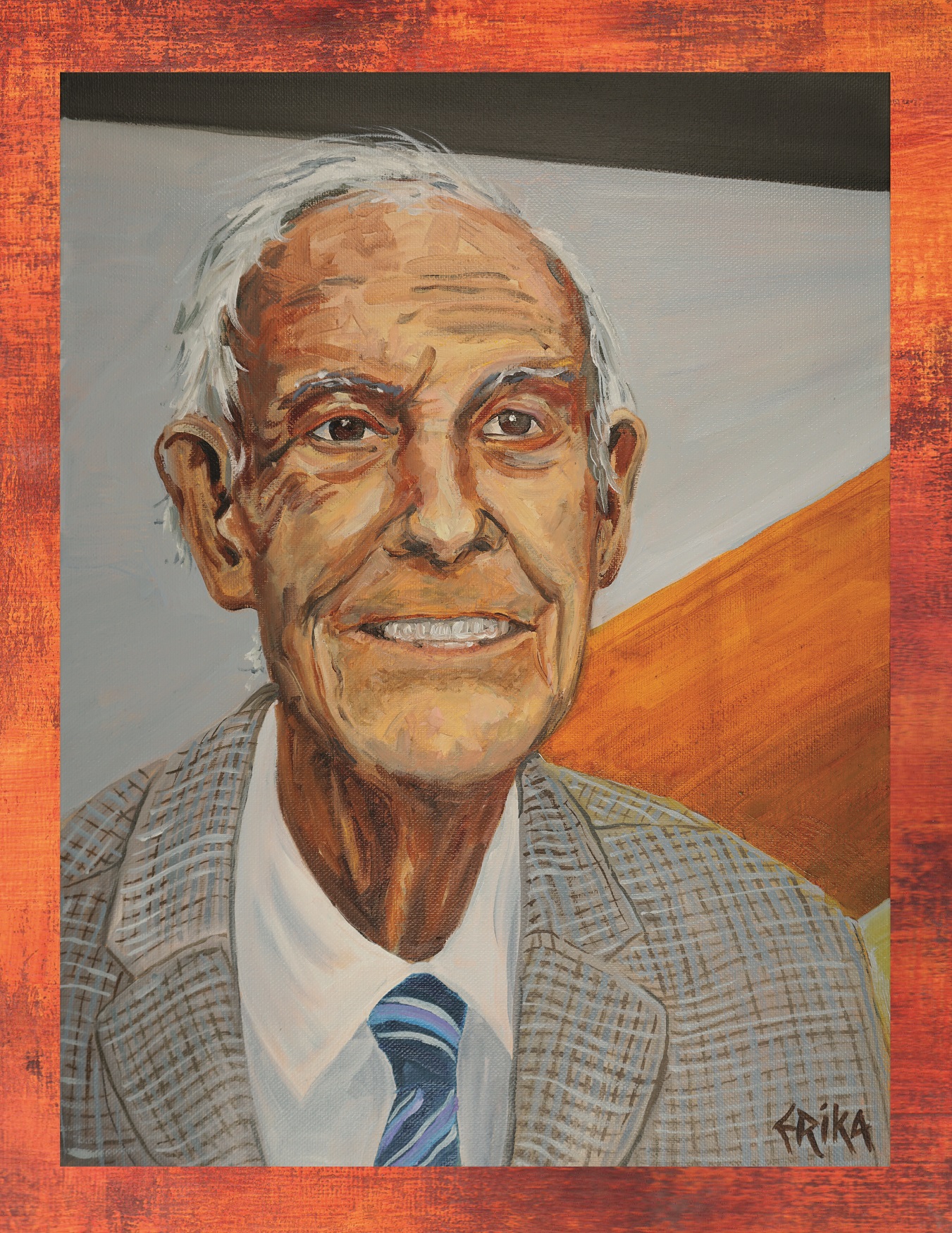 Portrait of Ken, by Erika Flowers
Portrait of Ken, by Erika Flowers
“I’m 97 years old, and I’ve lived in my present house for about 43 years.
But going back in history – before the Second World War, I’d always wanted to be a Spitfire pilot, because a lot of my friends did at that time, but eventually I finished up by going into the Royal Engineers, and I spent the next four years there…
I did end up coming back to this country because I finished up in Burma and the Far East, and we had some tidying up to do afterwards, after the war finished, and I didn’t get back here until 1947. And in ’47, it was a fine summer that year, which was a change from the Far East!… it was a lovely summer and I met my beautiful wife.”
“I must say that looking back, the really exciting part [of my life] was working in central London – I met so many good people, it was a real, very busy time at that time, and there was a lot of construction going on, I even had a very nice dinner in the main Guildhall. That was extraordinary, There was a speaker there who was an MP and a minister, and he was a chap I didn’t particularly like, but again, he was such a good talker.”
“Generally speaking, where we are, I think they’re very kindly people – certainly during this last year when I’ve been incapacitated a lot of the time, they’ve been very friendly and I can’t speak too highly. We, in fact, are very lucky, the piece of land we bought backs onto the green belt, and over the years… in the field behind, we’ve had all sorts of animals there. We had a herd of cows at one time, which were reared in a little local farm, and I got to know the farmer there and his wife…
How have I found staying indoors? Well, it’s been very boring at times, but I can’t walk very far, now… so I can’t go any great distance anyway. I do manage to get out in the garden and just trim one or two things up, but it can be a bore, but people have been very kind, they’ve phoned me up – I mean you have! It’s very nice to talk to you.”
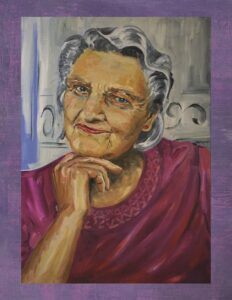
Portrait of Pam, by Erika Flowers
“I left school at 14 and worked in a bakehouse because I was going to do patisserie work, but got fed up as I had to do the cleaning. It was a cafe in Walton, and they had a separate cake kitchen. I learnt things from him from icing cakes, so I’ve done a lot of cakes in my time, wedding cakes.
The last cake I made was for my son’s wedding about 25 years ago. They then brought out rolled icing and I wasn’t used to that. I used piped icing and I used to do decorating and trellis work, so I gave up. My daughter then started doing them and my granddaughter now does them as well.”
“Pre-Covid, we used to meet quite often. They used to come here quite often. All the family would meet here for occasions, like our religious days and everybody’s birthdays. We’d met here and have meals here. Sorry, it’s very emotional. With Covid, everything stopped… During the lockdown when it was possible, they visited me in the garden… My family not being able to visit me, or I was unable to see them, was a terrible blow to me…
Luckily for modern technology, we were able to contact each other. We used to speak to each other on Zoom. Every week, when they were free, we used to get together, make an appointment, and then all of us, we all used to talk to each other on Zoom, play games online, play games together – my daughters, my grandchildren, everybody.”
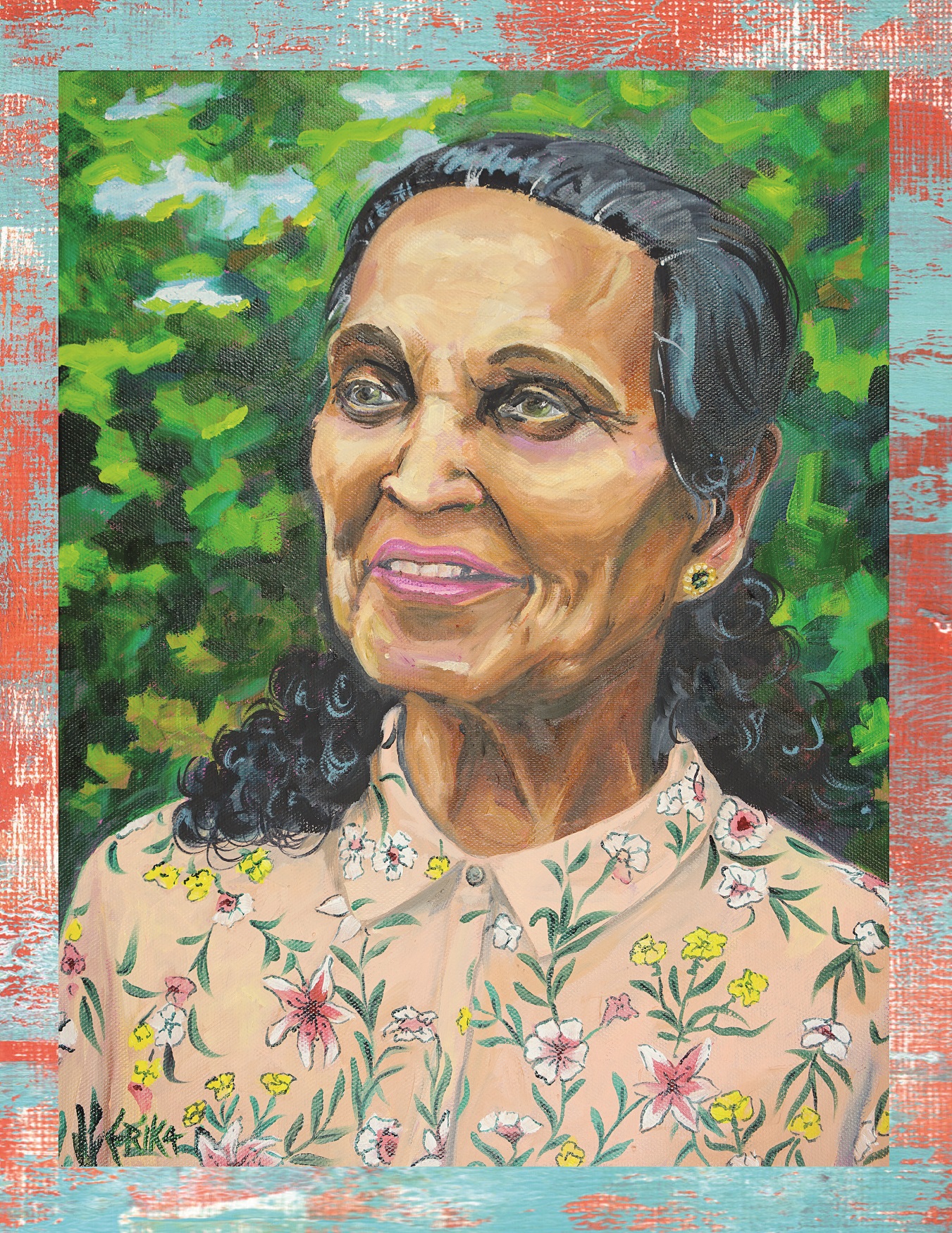
“I was born in Malaysia… my father was away, he was in Malaysia when he was young, and he got a job, and then he went back to Sri Lanka and got married, and we went there. I was born, educated there, I was there until my father retired, and in 1955 I was sent back with my brother to Sri Lanka…
[When we moved to the UK] it was totally different during that time, that way of life, we didn’t have all the facilities that we’ve got now. We had to share a house with so many other people, you know, we lived in a rented house, three-storey flats. So we lived there with paraffin heaters, no fridge-freezer, no washing machine, dishwasher, those days in ’66, ’67!”
“When I heard about the pandemic, I was devastated. I didn’t know how I could live without seeing my children, or being in contact with them, and how to spend the time.
During that time I used to go to a centre called Milaap, and when this pandemic broke, they closed it down, and we were not able to attend it. Then they started having Milap exercises through Zoom, and we had zoom activities for three days a week – we still do, from morning until the afternoon…
Those three days were very busy days, that’s what has helped me to get through the pandemic, doing all these activities… It was brain stimulating activities like, they used to send games through the links – like crosswords, sudoku, codewords… we’d do it over here and then send the answers back through WhatsApp.”
“I know people who are living far away from me, and I used to ring and talk to them… especially those people who had not had contact for some time, thinking that they would be in the same situation as I am.
I thought that if I rang and talked to them it would be helping them and I could cheer them up. So I made it a point to do that.”
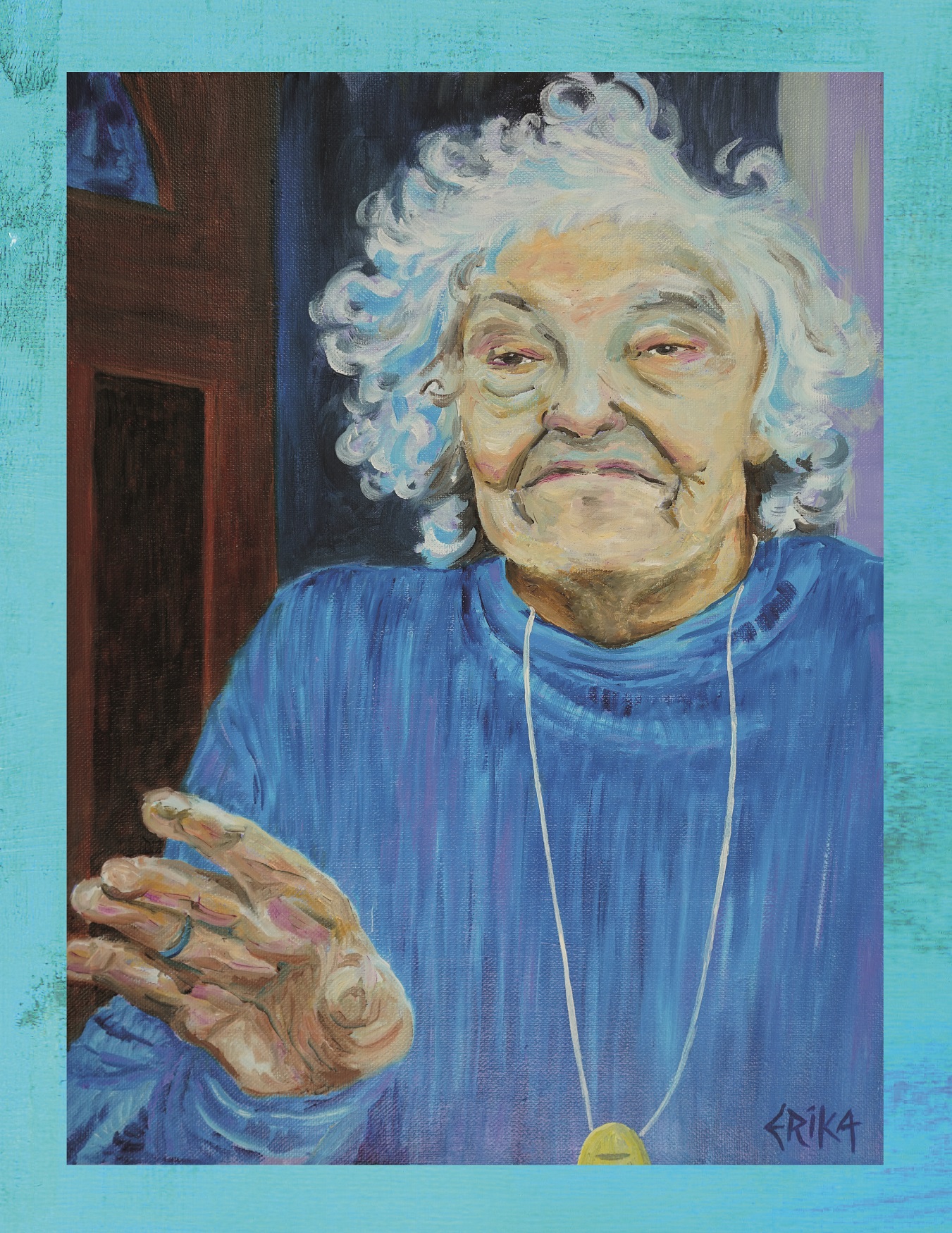 Portrait of Sheila H, by Erika Flowers
Portrait of Sheila H, by Erika Flowers
“You can’t do what you normally do, sing, write, art class – you’re stuck indoors. There’s only so many walks you can do. And as I’m disabled, I can go over there. And then come back. There’s a green the other side of the railway. Just over there.
How do you get over there?
I walk very slowly with my stick
Over the railway track?
There’s a bridge. Yeah, just over there. You can go under a few yards down.
And have you been for quite a few walks?
Not so much now. I do – no I’m lying, at night-time if I’ve not had anything on, I do take my stick and walk over there as far as the arch. And then I come back. Take my time. You might see somebody.”
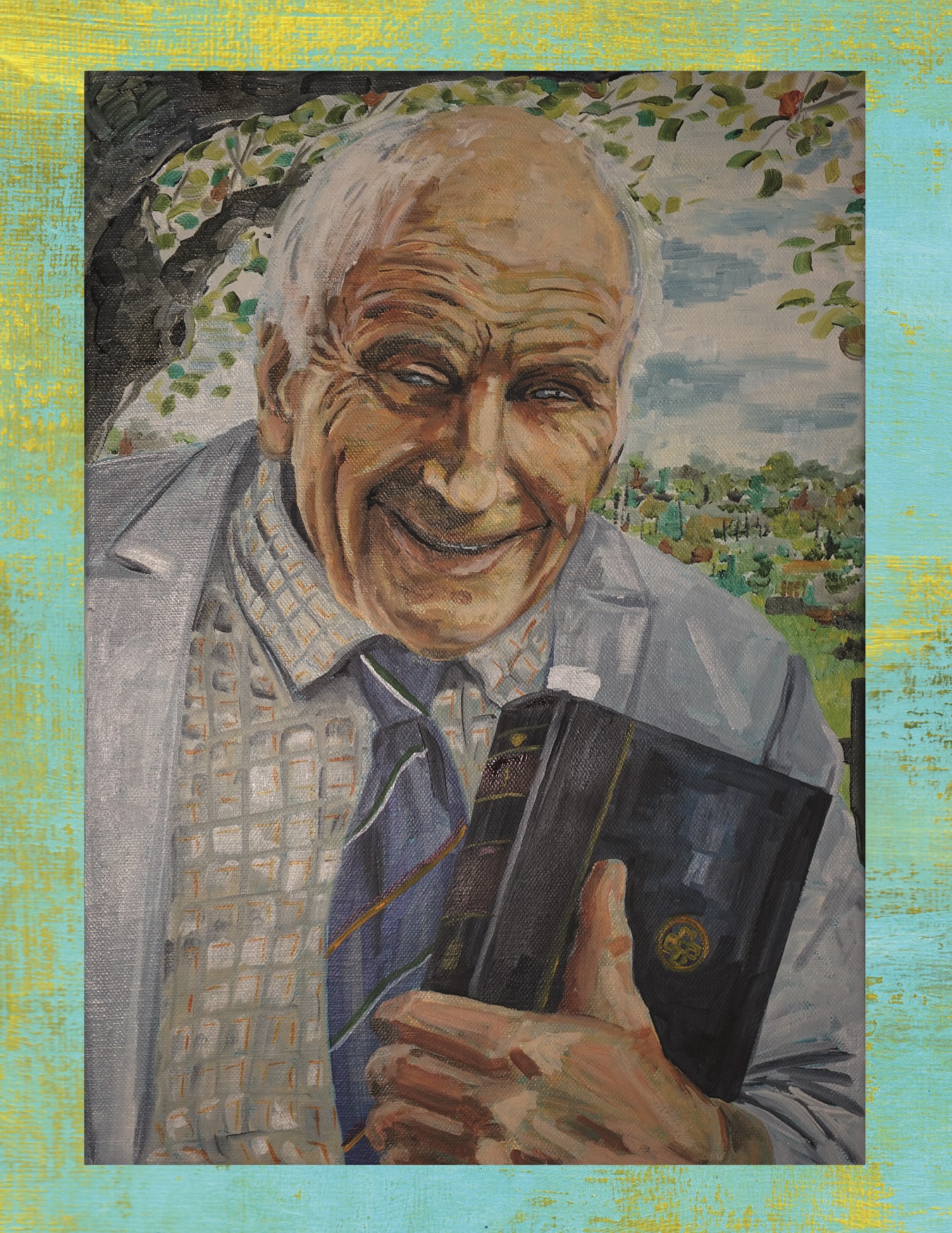 Portrait of Ian, by Erika Flowers
Portrait of Ian, by Erika Flowers
“Did you learn Greek at school?
I did!
And you enjoyed Greek?
Oh I did, I really did. More than Latin, although I got prizes for Latin… I used to say about my French, I’ve been learning French for seven years, but I can’t speak a word of it.
But Greek however, I imagine was a different story?
Oh, I couldn’t speak it. However, very nicely, in the army I got the offer of this Greek course. I had some friends who knew no Greek at all… we were given six weeks of phrases, that’s what we learnt, phrases, and the six weeks were intensive… And then we flew out to Cyprus, where we were fighting the Greeks… and when we got there, for two weeks we did nothing. I think if anything, it was to acclimatise ourselves, that was the idea… Then we had an oral exam in Greek, and they said where do we want to go, and I chose the Durham Light Infantry, because my father served with the Durham Light Infantry in the First World War. Anyway, it was a lovely posting away, the other end of the island – a place called Paphos, the most beautiful place, where Aphrodite the Goddess of Love was born. It was a wonderful place, wonderful.
And what year was that?
That would be ’58 to 9.”
“[As a child] I was put in the garden to play every morning, on my own. And I still remember how bored I was… until, suddenly one day, I found myself playing with my sister.
So she wad put out as well to play?
When she was old enough… And we had such lovely games, we had a lovely time, wonderful… We had a lovely garden, wonderful garden – full of hiding places. There was a tennis court there too, that we restored – it wasn’t looking like one then. So these friends down the road and up across the road were playing with us, played lovely games. Oh I had a very happy childhood.”
“Did your wife like reading?
Oh yes, she was a bookworm, yes, she adored reading. As a little girl, she was famous for squatting on the floor of the local bookshop reading for hours on end!
So that’s something you had in common?
We did. Also in common with my father – I think we both agreed, she said really I should be married to my father.
Because he loved to read as well?
Oh yes, yes.
And what year did you get married?
1970. Christmas Day, 1970.”
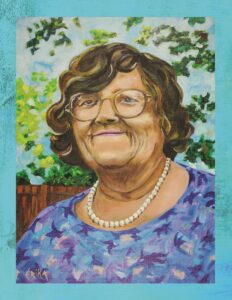
Portrait of Janet, by Erika Flowers
“What with this lockdown, it’s been terrible… It has [changed] now because we’re able to go out and about and things, and I’m slowly going with Irene to some of the groups we go on during the weekdays and that, which is very good, I enjoy it.
It’s good to get out and do a bit of gardening and that, and here I just wish people would join in more… A few people stay in their flats, but it’s a case of getting them all joining in…
Now that lockdown is easing, is there anything you’re particularly looking forward to getting back to doing?
Well just getting our coffee mornings going down here, getting everything going downstairs – like Irene wants to get everything going again down here, which I often help. If Irene’s away I help Tony, who came round today to look, I help him do coffees and teas and things, and we get the bingo going in the evenings, which will be good. And I hope Burview Hall starts again, where I used to go… arts and craft.”
“It’s [FaceTime’s] been much more used in Lockdown to be honest.
In fact, my son, he’s down at the coast at the moment, and when he’s down there he phones me up in the morning when he’s taking the dog for a walk along the beach, and he takes me for a walk along the beach with him. And then in the evening, he takes me for another walk along the beach!…
It’s quite funny really – ‘oh look mum’ he says, ‘the tide’s out’, you know – ‘oh, can you see Rocket?’, that’s the dog, a spaniel, and I can’t see him, he’s miles away having a lovely time on the beach, so yeah. As I said, I know people found it quite a struggle, but I can’t say I have.”
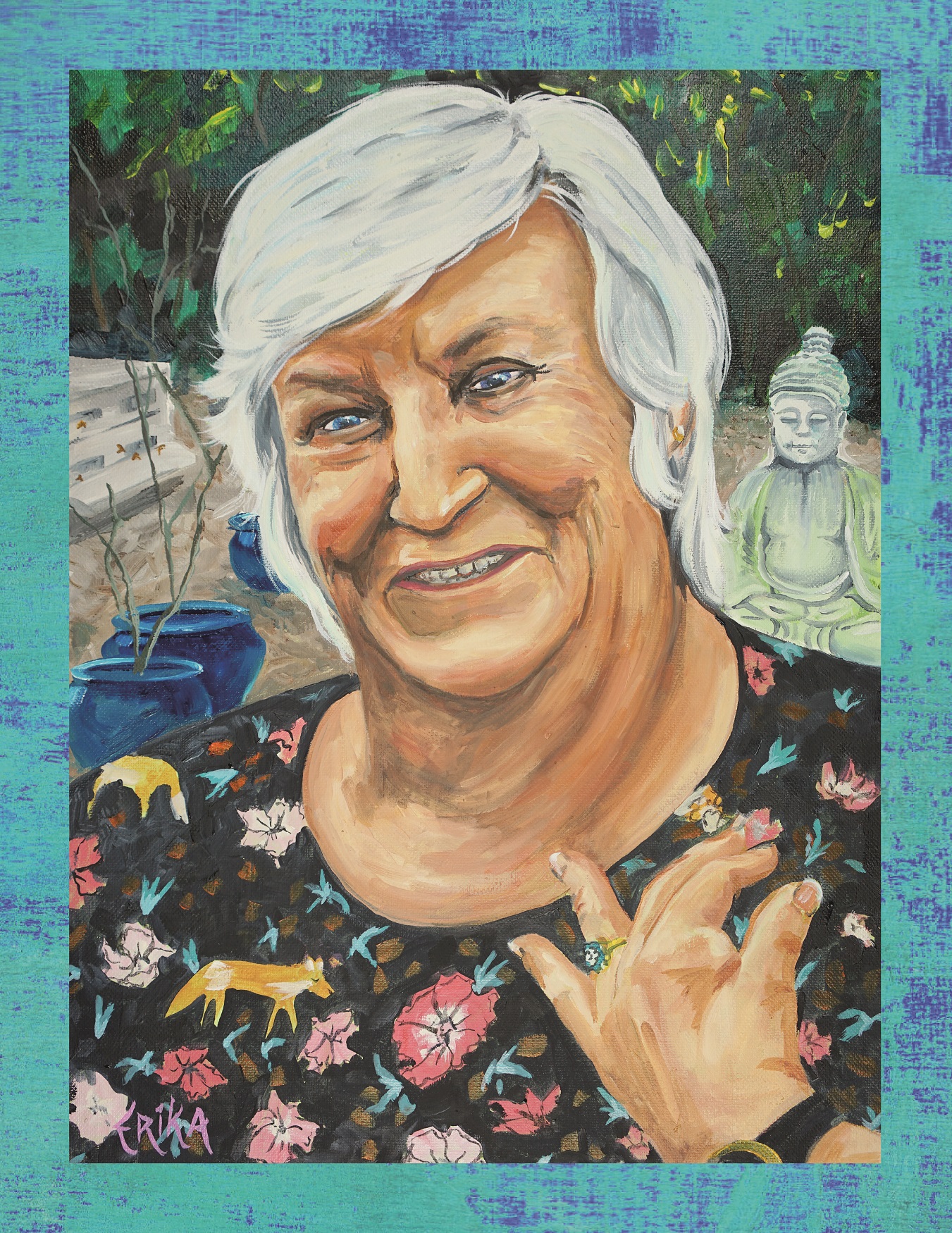
“At the beginning of lockdown, I thought to myself, I can’t sit on my bottom all the time, I’ve got to do something. There’s only so many times you can clear out a cupboard, clear out drawers, and I thought to myself ‘oh this is ridiculous, I’ve got to do something!’ So, I just looked on Google, to see if there was anything you could paint quite easily. As you saw, I’m not Leonardo da Vinci or anyone like that! I just enjoy it actually, but of late I’ve been so busy, I haven’t had the time, so I’ve got to get down to it sometime…
I had to put them [the paintings] somewhere, and my daughter-in-law said to me, ‘You can’t keep them hidden, you’ve got to put them somewhere!’, and I thought having them in the conservatory is not actually in your face, but they’re there to look at, if you know what I mean.”
“I felt worried [about Coronavirus] of course, because you’ve got to take notice of what they’re talking about, but not to the extent of thinking ‘Oh my God, I can’t do anything, I mustn’t touch anything.’
You know, you just sort of take it a day at a time, to see what was going on really, because the government always had a chat in the evening, you know, to let us know what was going on. But to be quite honest, they didn’t know what was going on to a certain extent, because they’d never come across this before… they were like us, they were blind really.”
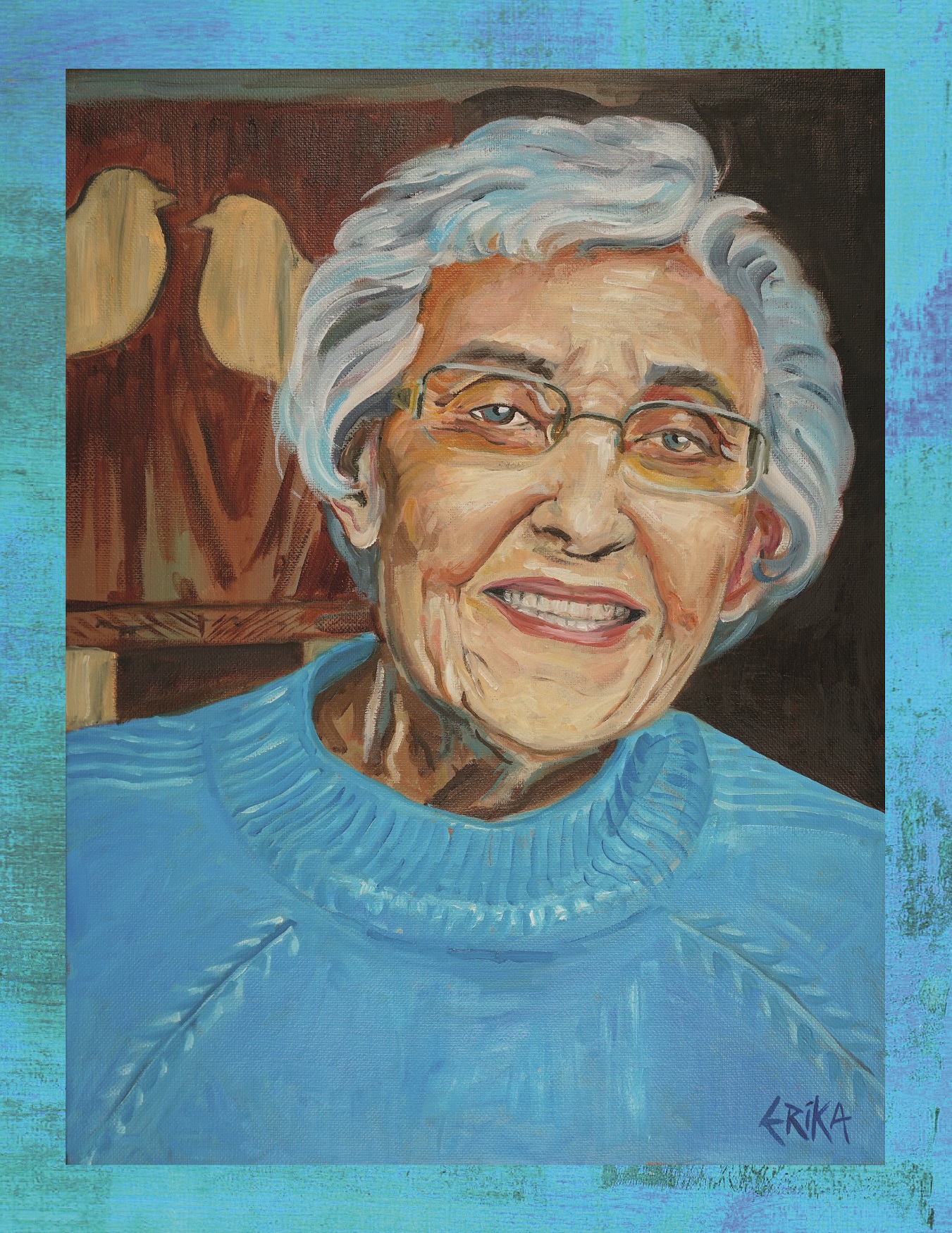 Portrait of Sylvia, by Erika Flowers
Portrait of Sylvia, by Erika Flowers
“I’ve got lovely neighbours – I’d only call out and somebody would be there, they’re lovely, and they all wave if they see me come to the door, they all wave. And the occasional cake comes across…
No, I can’t grumble – Hersham itself, I would not want to move away from it, I just loved it since we came, so – well I think through Harry [Sylvia’s husband], everybody knew Harry, and so therefore I got very involved very quickly. I even became a girl guiding Brown Owl. Oh, and I took charge of it, twit-twooing.”
“My friend Stella and I, who is not with me any more unfortunately, we used to go down to the Thames at Weybridge, and they used to have a bathing hut. And there used to be a gentleman there that used to make sure that you could swim properly before you could go deeper into the water.
Well, we were past going, so we decided that we would go over the Thames to the other side, under the bridge. And that’s where my brother John used to do exhibition diving, he used to dive off the bridge there. This time, when I had met Harry, we swam over – so we sat and rested on the ledge that is there. [She] said alright, ready to go Sylvia? So I said yes okay, off we went, and all of a sudden these little pebbles started popping around.
I said to Stella, what on earth is happening? There’s all these little splashes. What had happened, there was a row of cheeky faces looking down on us. He [Sylvia’s future husband, Harry] had just been demobbed from the air force, because he’d done his two years in the air force, then they met us on the other side, introduced themselves, they were perfectly gentleman-like, and off they went. By chance on the Sunday we went down to the coast for the day, and who should be on the sands, it was that same group, laying there.”
“But my mother – I’m from a family of eight, two boys and six girls – she was amazing, absolutely amazing – as you get older yourself, the more you look back – ‘how did you manage to do that?’ – and then how, you had to have work then, during the war, I can remember the war, and she used to work, it was called the Firelight Factory and it’s going towards the Thames, there’s all flats there now. But there used to be a factory there that was called the Firelight Factory.
And what the ladies from all over, no matter who, what age you were, you had to do something towards the war effort, and her job with one of the other family of one of the sisters maybe, was knocking the heads off shells that had been fired, and standing in the line – and then, coming home and feeding us lot, you know!”
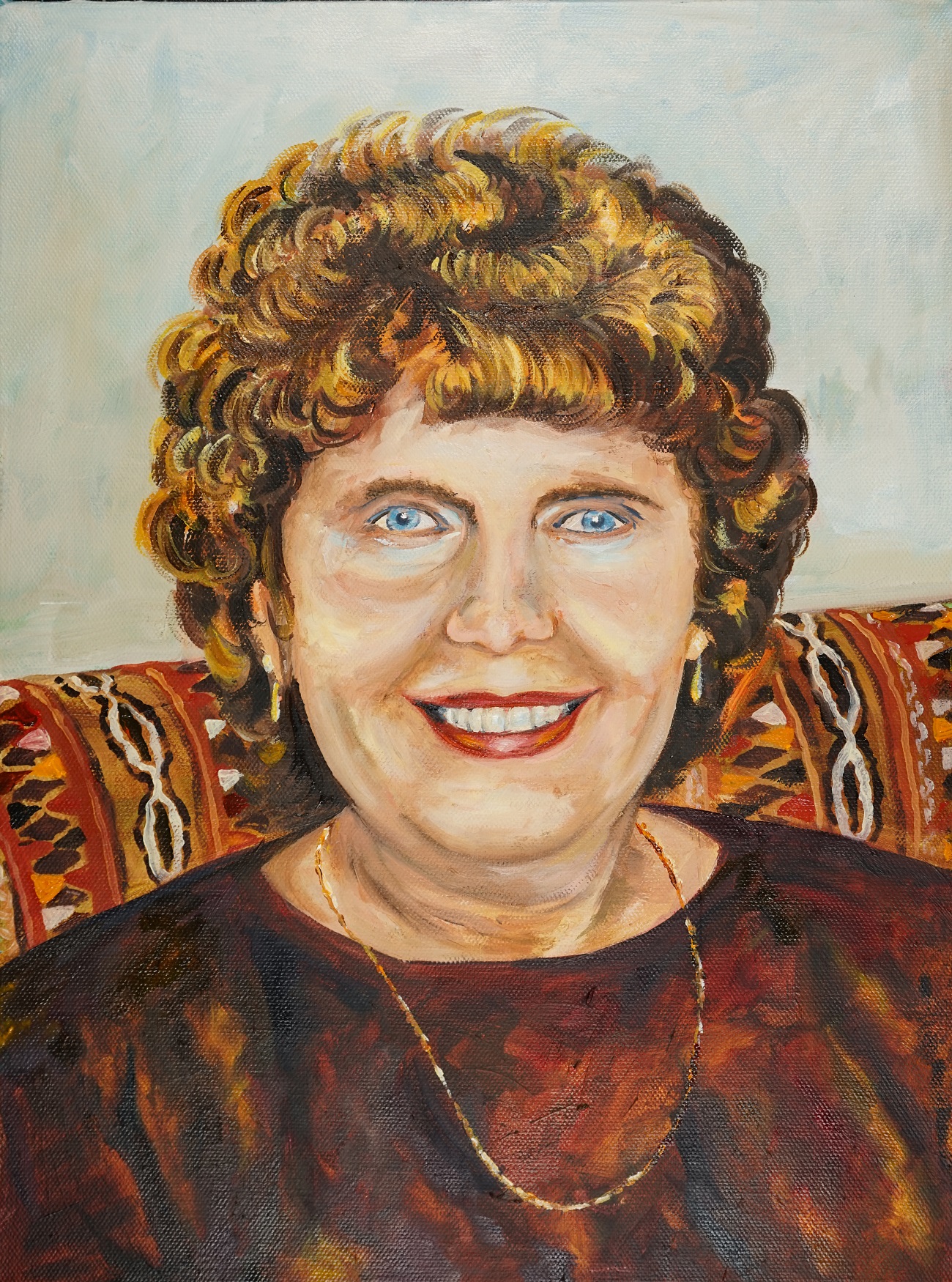 Portrait of Margaret, by Erika Flowers
Portrait of Margaret, by Erika Flowers
“I was still working at John Lewis’, I had another phone call, from Buckingham Palace – again. And I shook in my shoes, I thought, oh no, what’s happening, what’s happened this time! Anyway, again it was Lady Strathclyde, she said, we have been looking at your interviews, six months previously, that you had with Heather in Buckingham Palace. And she said… we want someone to look after Princess Diana when she marries Charles.’
Well, I didn’t know what to think, I didn’t know what to think! And I said, oh – oh she said, I haven’t put that correctly, you’d have to be a dresser, she said, lay out all her clothes out ready, you know, and getting her bath ready, and all things like that, like a lady in waiting. And I thought all these people were sort of royal people, like did that.
Anyway, I said well that would be a lovely idea. I said yes, I would really enjoy doing that. Anyway, again she said to me, can you come tomorrow for an interview? That was the very next day. And you know, the day they rang me, I was packing my case to go on holiday to Spain. And I said oh, gosh, no I can’t come tomorrow! I said, I’ll tell you why, I’m in the middle of packing my case to go to Spain. My hotel’s paid for, my airline, everything – I’d lose a lot of money if I hadn’t gone.”
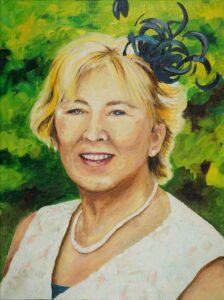
Portrait of Lorna, by Erika Flowers
“It [things in lockdown] changed a great deal, because once a month we had a meeting – there was eight of us would have a lunch together and meet, and that closed because we used to go to the local day centre.
They named us ‘The Loud Ladies’! When we said we’re coming for a special dinner, they always had a tag, a thing on the table, with ‘The Loud Ladies’ written on it. That obviously all stopped.
Last year’s lockdown, we decided that we would carry on meeting, but there could only be six of us, and we took our deckchairs and our picnics to Hersham Green and sat there. We’d end up sitting there all afternoon… But that all stopped, the weather started getting cold and it stopped. And then, of course, the lockdown happened again, so we just couldn’t meet.”
“I like woodwork. I did it first in Chertsey, in the mental hospital in Chertsey, and I didn’t do him, but I did other figures. Birds mostly? And then when I went to the Joseph Palmer Centre in Moseley.
I asked if I could do all art and crafts, and they put me in the woodwork. And they gave me this chunk of wood, which had come from the cherry tree they’d cut down the year before and said, you know, get on with that. And I, I decided that I would like to do a face. So I did the face and I thoroughly enjoyed doing it.
It took me about nearly a year of classes to get it finished, but I was very proud of it when I’d finished.”
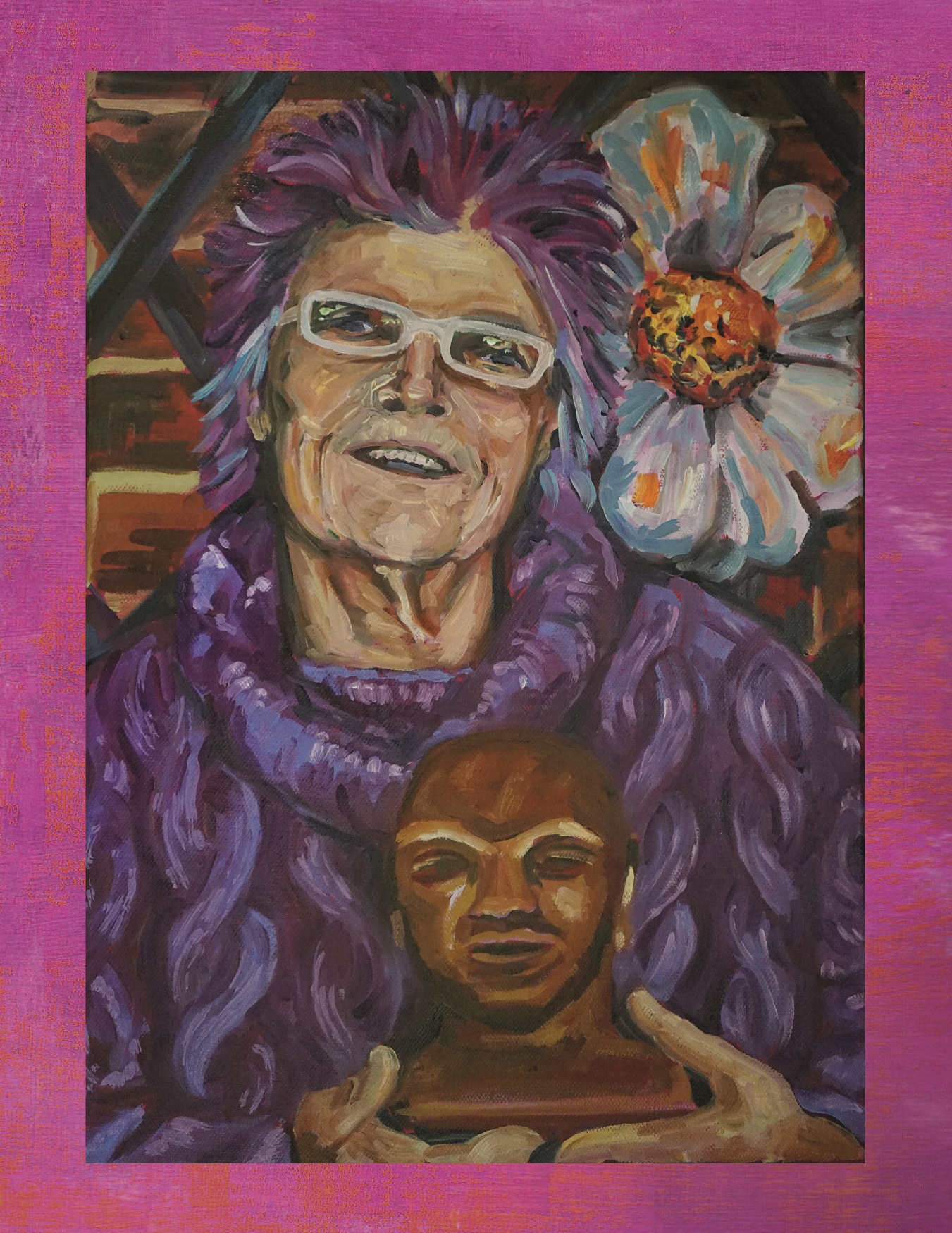
“I have OCD which makes it impossible to be in here without with peace of mind. So to go out every day gave me gave me peace of mind, but also I would be talking to people, we will be doing the work, we will discuss.
I used to like to show people how to do things. You know, how to help them and that was nice, and we’d all sit there laughing and joking and having a nice time and you felt good, you know, you felt you were worth it.
And being able to show people my work and then saying, that’s nice. I felt I was worth something. You know, it gave me self-worth.”
“I think in the beginning I was very very frightened of it. very frightened indeed. If anybody came to the door, I’d worry and I’d wait 14 days because then I knew I hadn’t got it and things like that. Now I’m not quite as scared of it as I was. I think I wouldn’t have gone out for a walk like I do now.
Now, one day a week, I meet a close friend of mine on the green. And we sit at each end of the bench with masks on and she brings a drink and I bring the biscuits and we sit there and we talk and it’s lovely to have somebody that’s face to face talking now which is very nice. I wouldn’t have done that in the first part because I would have been frightened of it…
I think perhaps I’ve learned a bit more patience. And not expect too much out of life from it. I’ve missed my holidays, too. In a way it’s changed me because I don’t think I want to go flying anymore really. I used to go on a lot of cruises. I’ve been to a lot of places and I’ve done a lot of cruising around. And there is one place that I still want to cruise to, which is fortunately I won’t have to catch a plane to go because I want to go to Greenland. I’ve always wanted to go to Greenland.”
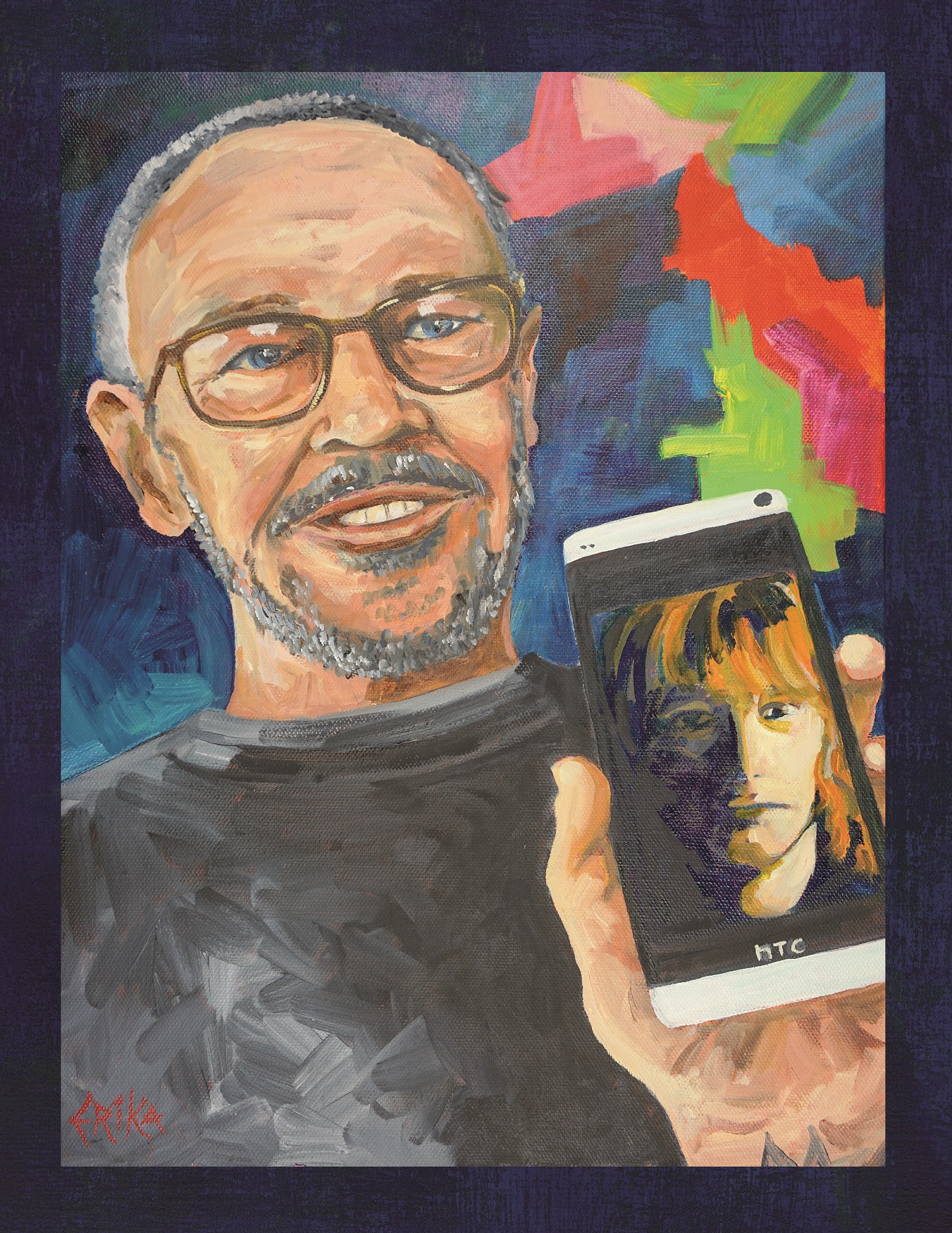 Portrait of Stephen, by Erika Flowers
Portrait of Stephen, by Erika Flowers
“I used to go and sit down there.
By the river?
Where those two girls are sitting, that’s where I normally sit, yeah. And, oh I’ve met so many people down there… they recognise me and, like, ‘hello mate!’, and because we’ve got the garage there, a lot of boats stop there to fill up, so it’s quite busy. And this one guy there, I had a chat with him, he said ‘we’re going up to Kingston, do you want a lift? Jump on’. Never met them before in my life – ‘yeah, come on, jump on the boat, we’ll take you’ – I didn’t want to go to Kingston, but I thought, a boat ride up to Kingston, I walked back along the river, and it’s fine you know, it’s better than telly…
Another friend of mine, he came past a couple of months ago, and him and three of his mates share a boat. And they just, they came past and they were like ‘Oi, Steve!’ And they turned round, and they said go on, jump on, we’ll drop you off at Kingston, and my son and his partner and my two granddaughters came down about 3 weeks later, I’ve never seen my youngest granddaughter before, so I phoned my mate Dean up, I said ‘can I charter your boat for an afternoon?’ He said yeah, ‘course you can, he said just, you pay for the diesel and we’ll go up to Hampton Court. And the weather was glorious, and we had such a brilliant afternoon, it was amazing.”
Interested in listening to more oral histories? Head over to our 'Elmbridge at War' online exhibition to discover the Memories of War project.
Go to the online exhibition
Leave a Comment
Do you have your own memories of the Coronavirus pandemic? Leave your thoughts in the comment section here.You need to be logged in to comment.
Go to login / register